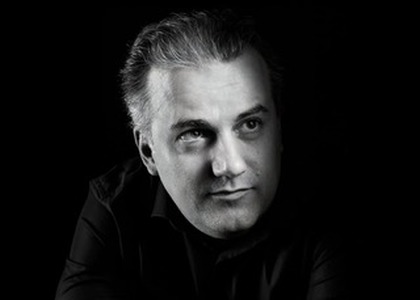> Interviews

Interview with pianist Josu de Solaun
Pianist Josu de Solaun is the soloist of the National Radio Orchestra in the season concert scheduled for Friday, March 28th, 2025, at Sala Radio. About his return to the Bucharest stage, the Spanish musician spoke with our colleague, Ioana Țintea.
You will be performing Tchaikovsky's Piano Concerto No. 1, one of the most famous and beloved works in the piano repertoire. When did you first approach this score?
I studied piano with Nina Svetlanova, an extraordinary Russian professor who was the wife of the legendary conductor Yevgeny Svetlanov. She was trained in Moscow under the guidance of the renowned Heinrich Neuhaus, who taught famous pianists such as Radu Lupu, Emil Gilels, and Sviatoslav Richter. Later, she emigrated to New York, and I had the privilege of studying with her there for 20 years. Under her guidance, I deeply explored the Russian repertoire. One of my favorite composers is Tchaikovsky. Moreover, I am very passionate about cinema. One director who has always fascinated me is Ken Russell, an extremely creative and nonconformist filmmaker. Among his many films, he made a production about Tchaikovsky's life-an extraordinary cinematic project that profoundly impacted me. The film was called The Music Lovers, and its entire soundtrack was built around this concerto. As a child, I used to watch it repeatedly, and the pianist who recorded the music for the film was the Spanish pianist Rafael Orozco. Furthermore, when I won the Enescu Competition, I performed the same concerto in the final round on the stage of the Romanian Athenaeum. That was a truly special moment because, symbolically, this music became the soundtrack of my life.
How do you perceive this piece now, from the perspective of your experience and musical maturity?
I now see it with perhaps less brilliance and virtuosity and more melancholy and introspection. It is a hymn to life, but it also holds a lot of sadness, tenderness, romance, and love. I find myself increasingly drawn to these aspects of the piece rather than its dazzling virtuosity.
What can you tell us about your collaboration with conductor Gaetano d'Espinosa?
It's wonderful because he is exactly the kind of musician I admire. Why? Because he is a conductor, composer, pianist, and violinist. I appreciate this versatility. I prefer musicians who explore multiple facets of art. I believe this diversity gives them a broader perspective on music-a panoramic view, like a vista from a mountaintop. And he embodies that perfectly. I like that.
What does the Romanian audience mean to you?
My wife is Romanian, my children are Romanian. I have recorded all of Enescu's piano music. Romania is, in a way, a part of me, like an extension of my being. Playing for this audience is a gift.
You have undertaken an ambitious project: recording the complete solo piano works of George Enescu. What initially drew you to his music?
Enescu's music is very profound and full of complex ideas. It is extremely nuanced and does not quite fit with today's times, which favor grand and general concepts rather than attention to detail. Enescu lived in a world of subtleties and fine details, and that deeply attracted me. But beyond his intellect, I was also fascinated by that ancestral Romanian ethos he brought to his music-a combination of mysticism, poetry, heroism, and pessimism, as we find in Miorița. Additionally, Enescu studied both in France and Vienna, allowing him to blend the two musical traditions and create something truly unique. His music has incredible layers of depth, a profundity that is rare in our times. Today, we live in an era that emphasizes appearances and presentation, the beautiful packaging of things, but not necessarily their content. Enescu, however, was a poet of substance, a profoundly modest man. He was a man of noble truth and pure beauty, always seeking essence. He is like a star guiding you through the darkness of night.
What other recording projects or important concerts do you have planned for the near future?
I have several recordings planned featuring Romanian music by Jora and Constantinescu. I want to bring their piano works to light, with a special focus on Mihail Jora's compositions. I believe he was a remarkable composer, but unfortunately, he was long neglected and forgotten. He was a great master of Romanian music, but he lived in a time when his works lacked sufficient promotion channels, so they became known mainly to a small circle of specialists. Nevertheless, I am convinced that Jora was an outstanding composer. I am working on these recordings, as well as on my own music and a complete version of Chopin's Mazurkas. I compose my own music, conduct, perform, teach, play chamber and solo music, write about music, and write books-so I enjoy doing many things.
Translated by Vlad-Cristian Dinu,
University of Bucharest, Faculty of Foreign Languages and Literatures, MTTLC, year II
Corrected by Silvia Petrescu














